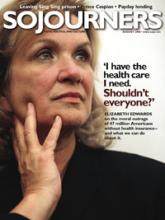Last March, after I gave a speech in downtown Cleveland, a woman, pressed and dignified in a business suit, leaned over and whispered in my ear. “My name is Sheila, and I am afraid,” she said, her face softening. “I am afraid for myself and for my children. I have a lump in my breast, but I cannot get it checked because I have no insurance.”
She must have been working, for few of us would dress in a suit and stockings voluntarily, and she must have been terrified. A mother thinking of her children, and terrified. “Stay right here,” I said, pressing her arm and going to search for relief for her.
But in the minutes it took to find someone who might be in a position to help a working mother find the health care she needed, she was gone. Perhaps her lunch hour was over. Perhaps she was already late getting back to work. Or perhaps she thought that she had not, in fact, whispered in the right person’s ear.
That moment in Cleveland was Sheila’s insurance policy. That was what stood between attention to a lump that might be cancer and the inattention that could lead to her death. I am terrified for her, and if by some divine providence she reads this piece, I ask her to please find me again. I want to help Sheila and the millions—yes, millions—whose stories are similar to hers. There are 47 million Americans who lack health insurance: That’s nearly one in every seven Americans, who, if a health crisis strikes, will need to hope for a miracle.
Sheila’s story is a parable of a health-care system in crisis. Most intelligent observers (and I say “most” advisedly) agree on that. What they don’t agree on is where we should go from here.
Read the Full Article

